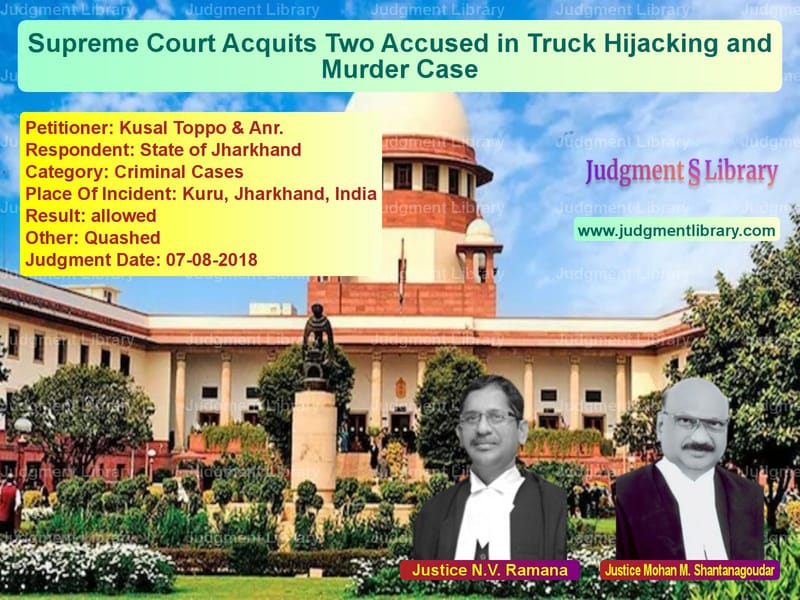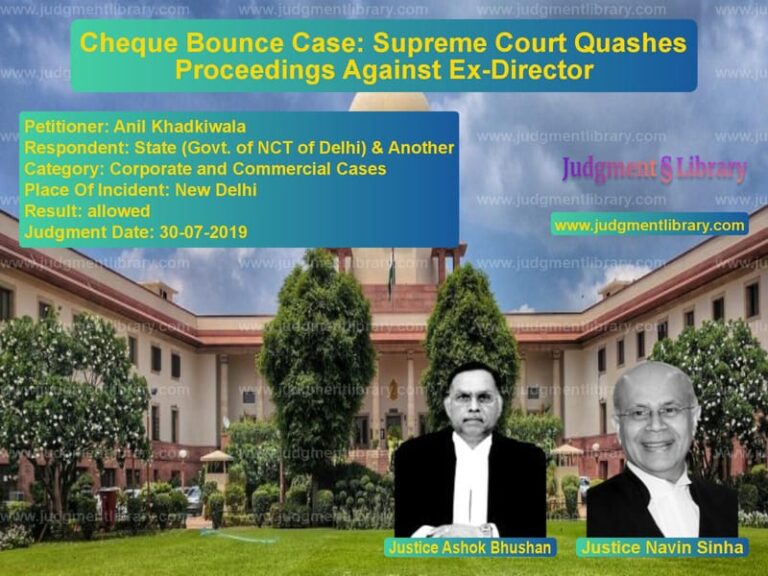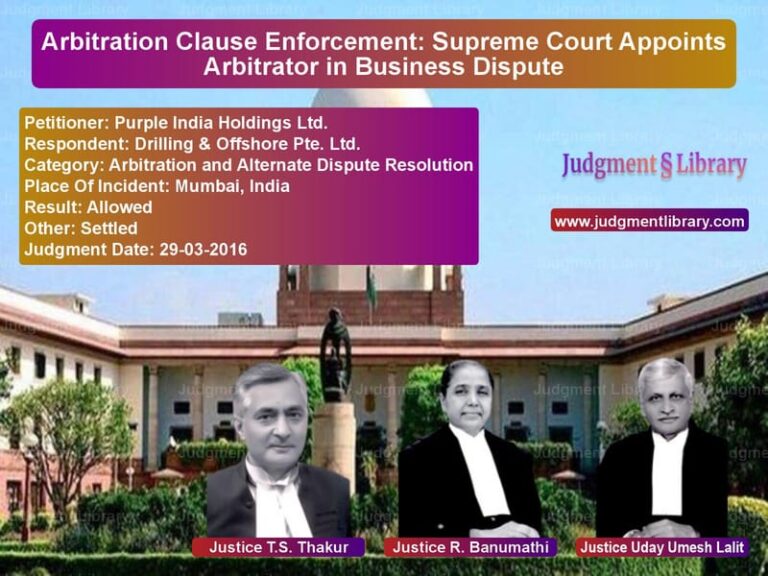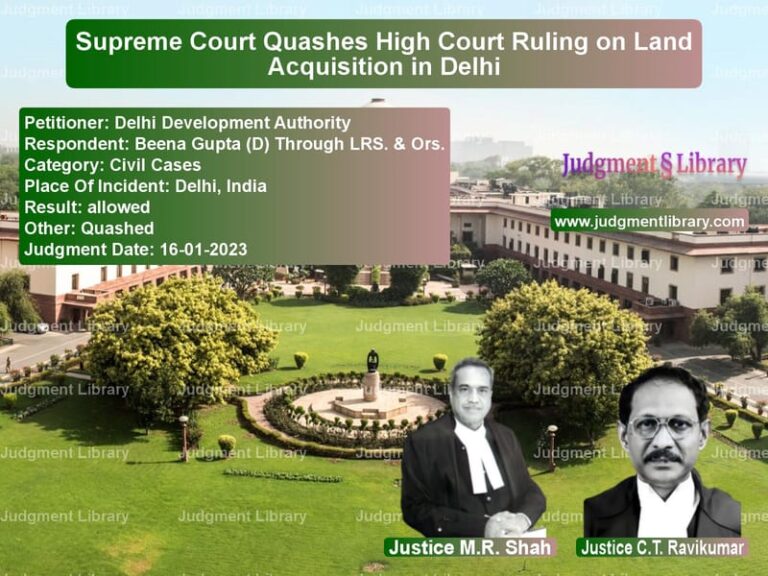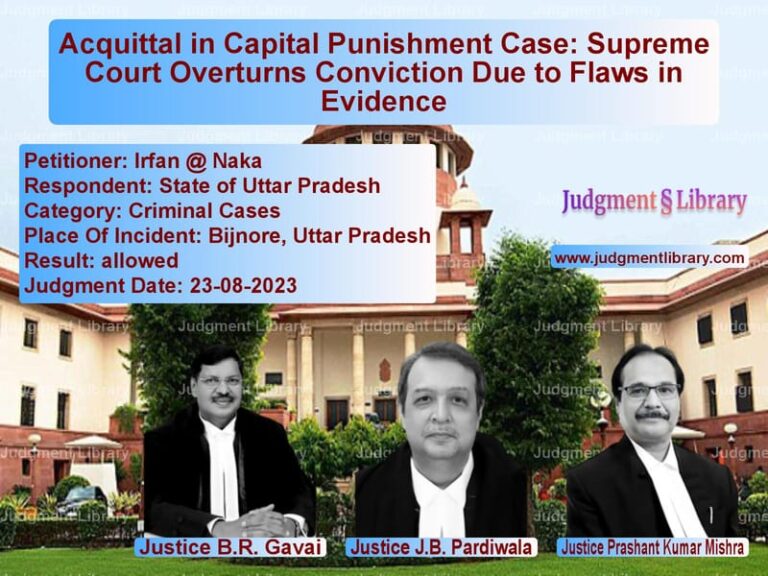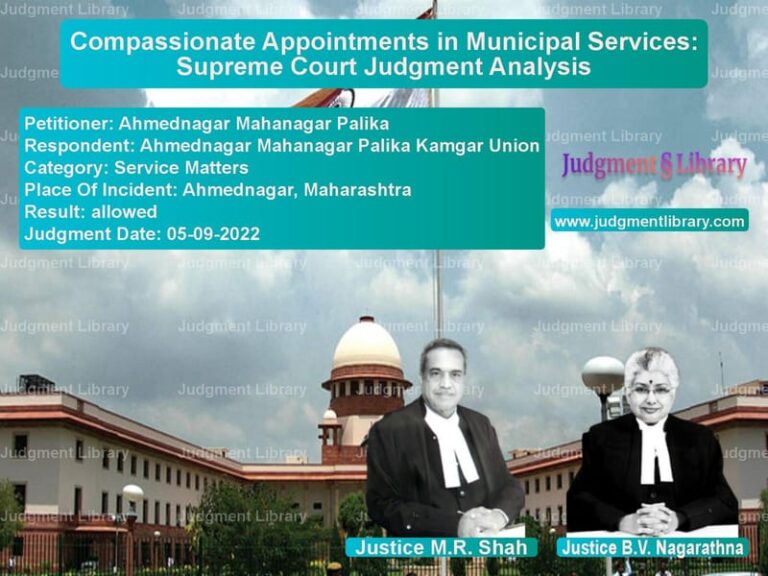Supreme Court Acquits Two Accused in Truck Hijacking and Murder Case
The Supreme Court of India, in its judgment dated August 7, 2018, ruled on an appeal concerning the conviction of two accused in a truck hijacking and murder case in Jharkhand. The case, Kusal Toppo & Anr. vs. State of Jharkhand, involved a brutal crime in which three people, including the truck owner, were murdered. The appellants were convicted by the trial court under Sections 392 (robbery) and 302 (murder) of the Indian Penal Code (IPC) and sentenced to life imprisonment. The High Court upheld their conviction. However, the Supreme Court overturned the convictions, citing the unreliable nature of extra-judicial confessions and lack of corroborative evidence.
The judgment emphasizes that extra-judicial confessions must be corroborated by independent evidence before they can be used as a basis for conviction.
Background of the Case
The case pertained to an incident on December 4, 1999, when a truck carrying goods from Latehar to Ranchi was hijacked near Kuru in Jharkhand. The truck owner, Sita Devi, along with the driver and cleaner, were found murdered near Aamjharia Valley. Their hands were tied, and their throats were slit. The truck was found abandoned, and cash, gold jewelry, and a demand draft were reported stolen.
The First Information Report (FIR) was lodged by the truck owner’s brother-in-law, Binod Agrawal, on December 7, 1999, at Chandwa Police Station after he was unable to get the case registered at Kuru Police Station.
Petitioner’s Arguments
The appellants, represented by their counsel, argued that:
- Their convictions were based solely on extra-judicial confessions allegedly made by co-accused persons, which is a weak form of evidence.
- There was no direct evidence linking them to the crime, and the trial court failed to establish a clear motive.
- The prosecution relied on circumstantial evidence without proper corroboration.
- The so-called confession recorded by the police was inadmissible under Section 27 of the Indian Evidence Act, as it did not lead to the discovery of any crucial evidence.
Respondent’s Arguments
The State of Jharkhand argued that:
- The extra-judicial confessions of co-accused were voluntary and led to the recovery of stolen property, which proved their involvement.
- The testimony of prosecution witnesses supported the prosecution’s case, and the conviction was well-founded.
- The brutality of the crime warranted the strictest punishment, and the Supreme Court should not interfere with concurrent findings of fact by the trial court and High Court.
Supreme Court’s Observations
The Supreme Court, after examining the evidence, found several flaws in the prosecution’s case. The Court ruled:
“An extra-judicial confession is a weak form of evidence and must be corroborated by strong independent evidence before it can be relied upon to convict an accused.”
The Court further noted that the confessions were allegedly made before a hotel owner (PW-1) and another witness (PW-2). However, PW-1 turned hostile during the trial, and there was no independent corroboration of these confessions. The Court observed:
“In cases where the prosecution heavily relies on extra-judicial confessions, the burden is on the prosecution to establish that the confessions are true, voluntary, and corroborated by reliable evidence.”
The Court also found that the alleged recovery of a rope used in the crime was not a decisive factor since it was a commonly available item and no forensic evidence linked it to the murder.
Final Verdict
The Supreme Court ruled:
- The convictions of the appellants under Sections 392 and 302 IPC were set aside.
- The appellants were acquitted of all charges.
- The appeals were allowed, and the appellants were ordered to be released immediately.
Conclusion
The ruling in Kusal Toppo & Anr. vs. State of Jharkhand underscores the principle that convictions must be based on strong, corroborative evidence rather than weak extra-judicial confessions. The judgment highlights the importance of due process and the need for courts to be cautious when relying on confessions that are not backed by independent evidence. This case serves as an important precedent for upholding the rights of the accused in criminal trials.
Petitioner Name: Kusal Toppo & Anr..Respondent Name: State of Jharkhand.Judgment By: Justice N.V. Ramana, Justice Mohan M. Shantanagoudar.Place Of Incident: Kuru, Jharkhand, India.Judgment Date: 07-08-2018.
Don’t miss out on the full details! Download the complete judgment in PDF format below and gain valuable insights instantly!
Download Judgment: Kusal Toppo & Anr. vs State of Jharkhand Supreme Court of India Judgment Dated 07-08-2018.pdf
Direct Downlaod Judgment: Direct downlaod this Judgment
See all petitions in Murder Cases
See all petitions in Theft and Robbery Cases
See all petitions in Bail and Anticipatory Bail
See all petitions in Judgment by N.V. Ramana
See all petitions in Judgment by Mohan M. Shantanagoudar
See all petitions in allowed
See all petitions in Quashed
See all petitions in supreme court of India judgments August 2018
See all petitions in 2018 judgments
See all posts in Criminal Cases Category
See all allowed petitions in Criminal Cases Category
See all Dismissed petitions in Criminal Cases Category
See all partially allowed petitions in Criminal Cases Category

